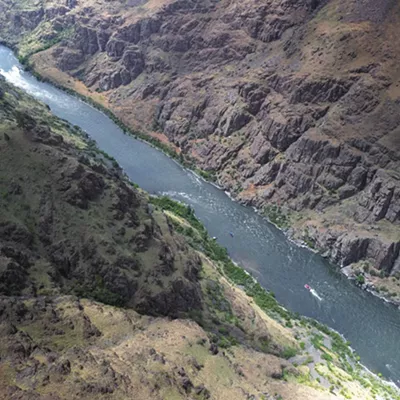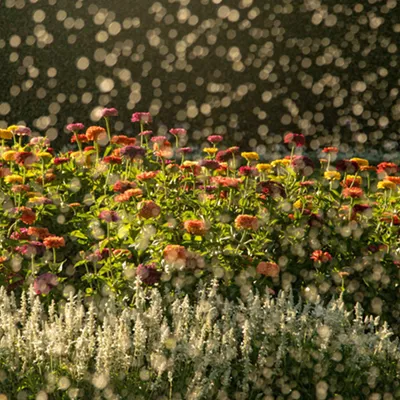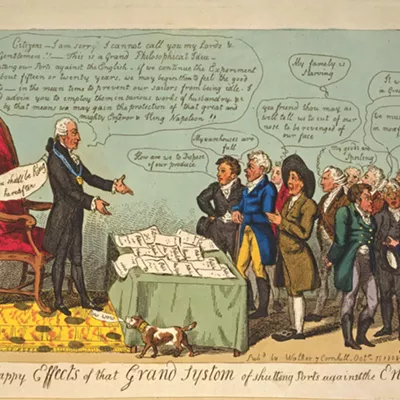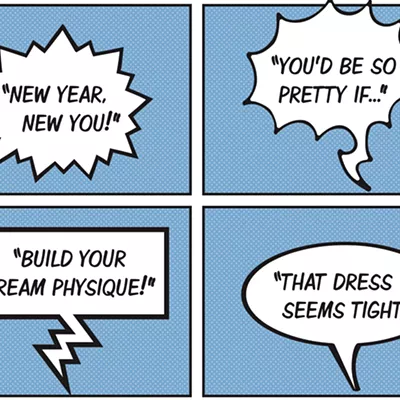
It is Thursday after a very long winter, and I am not coping well. It has been a long winter, and what I want more than anything is to go to the river. To drive down a thousand feet into a place where wildflowers are blooming in green meadows. Where the sun is glinting off the river. I need to escape the bleak view. The white sky. The seemingly endless cold.
So I loaded the car with dogs and sandwiches and started to drive. This place I am going has flowers and river and also art. Pictographs — thousands of years old on boulders cast like dice onto the river plain. I need to consult these stones, pray to them, sit among them for solace.
On the drive, I can feel some of the heaviness lifting, and then I am passed by a giant fifth wheel, which is not abnormal for this stretch of road. But as it settles back into its lane, my eyes land on the RV's model name: COLUMBUS 1492. I blink twice. Certainly no one would purposefully give something that name. It's 2024. We're honest now, aren't we, about the destruction wrought by the man and what the ships brought? And it's not the RV that bothers me, I have a camper myself; it's that a huge company like Forest River would not understand how that name is retraumatizing, perpetuating colonialism. How could a company with so many smart people in it not say something? But I let it pass. I remind myself that in just an hour or so there will be so many arrowleaf balsamroot that the hills will be in golden quilts.
I am halfway there when another RV comes up behind me. Across the top and above the cab in my rearview mirror the name is framed GREY WOLF. And for a moment I think, well that's good — awareness for wolves where people recreate, even if it's just through a name. And then as it passes me, I see that the full name is the Cherokee Grey Wolf and that it's a "toy hauler" and can't help but wonder if there's a snowmobile in there?
I wonder because burned into my mind is the picture of a female gray wolf and a man named Cody Roberts who on Feb. 29 ran her down with his snowmobile, his toy, breaking her bones. He then sicced his dogs on her, duct taped her mouth, and later took her to a bar and posed in photos with her, as reported by WyoFile.com and Cowboy State Daily. Roberts then took her out behind the bar and shot her.
I am as angry as I was the first night I saw the picture, and I think, why didn't anyone stop him? Did no one at the Green River Bar in Daniel, Wyoming, feel disgusted by the treatment of this wolf? I like to think that, had I been there, I would have gone to jail for defending the dignity of the wolf's life and gotten the wolf into some kind of care, but I remind myself that I am going to the river, I am turning left and leaving my questions behind for a while.
As I crest the summit, the hills are yellow with balsamroot. And the meadows are green. And the road is steep and winding, and I know that at the bottom I will find the river as it has been for millennia. I will find the strewn boulders as they were left by the glaciers. The art as it was left by the ancestors. The peace that wildness holds. And the further down I go into the canyon, the more weight is lifted. And I roll the window down and point my elbow out and take in the deep, forgiving smell of spring.
But things have changed. Now cattle dot the landscape, and, I think, its treaty land, these must be treaty cattle. And I feel OK about this, even hopeful, until I see the cattle milling about the boulders, their green spring shit sprayed onto the art, and I think, doesn't anyone care? And I think that I will take pictures and write letters, and I let everyone know that the art at Pittsburg Landing, art older than any we house in museums, is being destroyed, and we must stop it and that somebody must do something to stop this.
And I think about the essay I am going to write about animal cruelty so that people know Cody Roberts only paid a $250 fine — a misdemeanor violation of Wyoming's prohibition against possession of live wildlife. After the outrage mounted, in April the Sublette County sheriff and attorney announced an investigation into Roberts. Two national animal welfare organizations believe he should be charged with a felony under Wyoming's anti-cruelty law.
And I think about whether Forest River will reconsider the name of their RVs if I write to them and point out that having one RV named for a colonizer and another named for the colonized perpetuates colonialism. Then the weight of my thinking falls forward into my hands, and I feel so helpless. And I just sit there among the wildflowers and boulders and cow shit and cry. And then I start laughing because the metaphor is so apt, and maybe I should just go home.
But the laugh catches in my throat, turns back into a sob, and I stay. The afternoon stretches into evening, and the setting sun pulls shadows of the canyon across the meadow and shakes calm, like a quilt over me. Perhaps this was the right choice, coming here. Perhaps there is a reason this place has drawn people for so long. Maybe it isn't just about escape, but about holding contradictions. The beauty and the destruction, the despair and the resilience. Maybe it is about sitting here, amidst the wildflowers and cow shit, and simply bearing witness. In this quiet, perhaps the next step, like the art on these boulders, will reveal itself. ♦
CMarie Fuhrman is the author of the collection of poems, Camped Beneath the Dam, and co-editor of two anthologies, Cascadia Field Guide and Native Voices: Indigenous Poetry, Craft, and Conversations. Fuhrman is the associate director of the graduate program in creative writing at Western Colorado University. She resides in West Central Idaho.






















